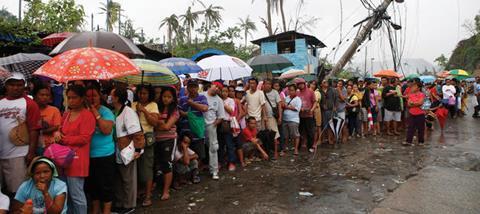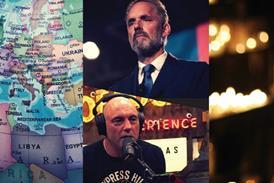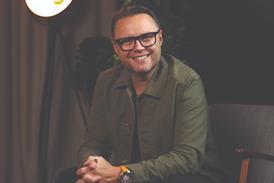
Super Typhoon Haiyan devastated the Philippines two months ago, and with hundreds of thousands of people still homeless, some aid workers fear the public may have already forgotten the disaster. Since the first horrific images hit our screens, a major world figure has died and our MPs have been given an 11% raise. As news moves on, so too will some of the more opportunistic charities, leaving the task of reconstruction for NGOs with a more long-term approach.
Right now, according to Andrew Hogg, head of media at Christian Aid, the focus is still on getting food and essential supplies to people in remote areas. Figures suggest that most donors prefer to give money to immediate disaster relief. But, he says, ‘the real challenge is going to be to sustain interest and to sustain people’s charitable disposition’ during the rebuilding, which will be a long process.
Large fishing vessels that provided employment have been destroyed. Homes will need to be rebuilt, ideally not in exposed areas. Rice crops have been wiped out, and coconut palms, which take five to seven years to grow, have been killed. In five years’ time it is unlikely that Haiyan will be at the top of many aid agencies’ or media outlets’ priorities.
It’s not just that fast-moving media agendas don’t help us to think long-term, Hogg says, they can also be counterproductive. ‘It will be only a matter of months before the BBC or somebody else like that goes over there and starts saying: “Where’s all the aid?”’
While Hogg, himself a former investigative journalist, thinks it perfectly right that the media asks tough questions of charity and aid agencies, he says it would be ‘a huge shame if the antipathy they stir up around the subject were to deter people from giving’
An additional barrier to giving, many fundraisers say, is that donors find it difficult to give to causes they don’t fully comprehend. The Disasters Emergency Committee’s Haiyan appeal has, in a few months, raised £76m. Their Syria appeal has raised just £23m. Steve Sanderson of Baptist mission and development agency BMS World Mission says they have seen a similar disparity in giving. Natural disasters, he says, are just easier to understand. ‘They are not complex conflicts where it’s really hard to know who the good guys and bad guys are,’ he says. ‘There’s a simplicity that makes an emotional response far easier.’
With temperatures plummeting in Lebanon’s Syrian refugee camps, the need is increasing, and unlike a typhoon, the violence that first filled them continues. ‘Man-made’ disasters are harder to raise money for. But simply referring to the Philippines crisis as ‘natural’ is an oversimplification. When poor countries suffer natural disasters, the loss of life and trauma to populations is exponentially higher than proportionate disasters in wealthy countries. Christian Aid estimates that rebuilding in the Philippines could cost up to $15bn, and the country still owes $20bn in interest on debts racked up by former dictator Ferdinand Marcos.
If the general public understood the complex challenges facing the Philippines, would we join Christian Aid and the Jubilee Debt Campaign in calling for the cancellation of the Philippines’ debt, or simply decrease our giving?



























